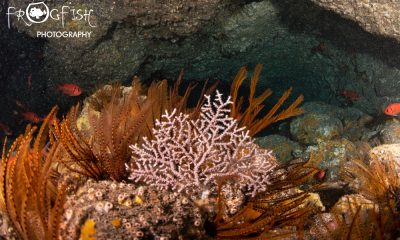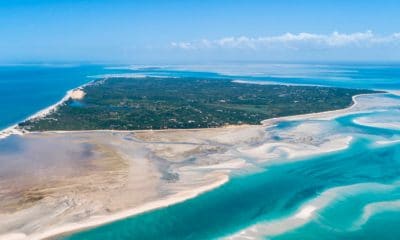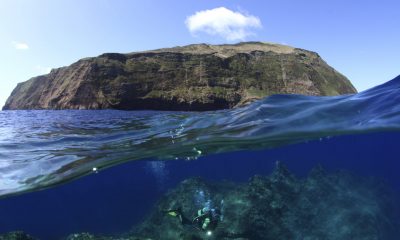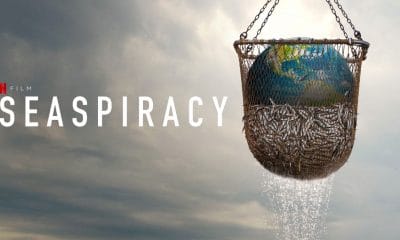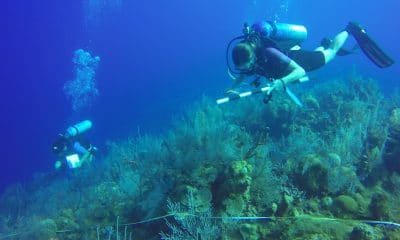News
National Marine Aquarium Asked To Drop Fish From Menu
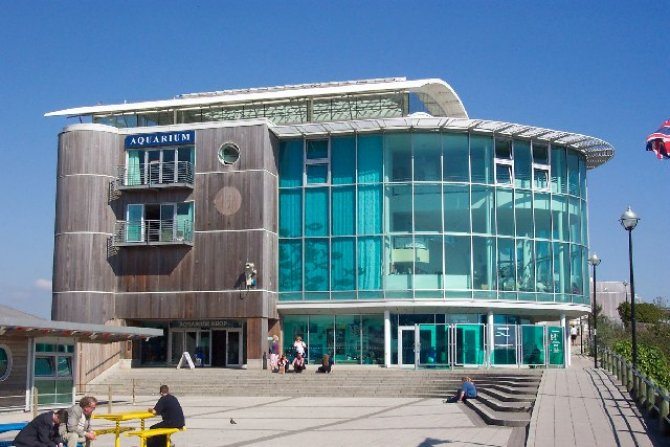
On the 19th Feb PETA (People for the Ethical Treatment of Animals) wrote to the Plymouth National Marine Aquarium calling on policy-makers to stop serving dead fish at in-house restaurants – a practice that contradicts the aquarium’s invitation to the public to appreciate the wonder of living fish.
I have long been aware of the pain and stress we put marine animals through when killing them for food, as well as the immense disregard for the fragile ecosystem that supports them. I know from personal experience the great work the Plymouth National Marine Aquarium does for marine research and public awareness of our oceans, but having a fish restaurant is sending confusing and mixed messages about conservation and animal welfare. Surely they should be leading the way into researching alternative food sources that can be equally financially beneficial as well as ethical.
If you are interested by the following article please write your own letter to Dr David Gibson, Managing Director, National Marine Aquarium or copy the one below and let him (and us) know your feelings. This topic will be opened up in our Forum Pages.
PETA – “Experts agree that fish are sensitive, interesting animals who feel pain and have complex social structures. No one – particularly a facility that is supposed to promote respect for sea life – needs to put them on the menu”, says PETA Director Mimi Bekhechi. “The rise of so many delicious, readily available faux-fish dishes means visitors can enjoy a tasty meal without slaughtering animals.”
Biologists have found that fish develop relationships with each other and grieve when their companions die. Some fish are capable of using tools, while others gather information by eavesdropping. These intelligent, sensitive animals are so good-natured that Dr Sylvia Earle, the world’s leading marine biologist, has said, “I wouldn’t deliberately eat a grouper any more than I’d eat a cocker spaniel”. PETA, whose motto reads, in part, that “animals are not ours to eat”, encourage all caring people to choose tasty vegan options.
Their letter reads:
Dr David Gibson, Managing Director, National Marine Aquarium
From: Dawn Carr, PETA
10 February 2015
Dear Dr Gibson,
I’m writing from People for the Ethical Treatment of Animals (PETA) UK on behalf of all the fish in the sea to ask the National Marine Aquarium to end the sale of seafood in its cafés. The National Marine Aquarium advertises itself as a place where people can cultivate an understanding of and admiration for sea animals. Yet after inviting people to look on these glorious, fascinating animals in awe, it’s odd that your cafés then invite people to stick a fork in them. Serving fish in an aquarium is like serving monkey nuggets at a zoo.
Talk of “sustainable seafood” fails to consider the implications for individual fish, but the fact remains that the seafood in your cafés is made from living sea animals who treasured life and were needlessly subjected to pain and fear.
And human consumption of sea animals is the very cause of the catastrophic destruction of life in the Earth’s oceans. Fish farms introduce non-native animals into sensitive ecosystems, and commercial fishing ships “clear-cut” the ocean floor and inadvertently maim and kill billions of non-target marine animals, including porpoises and sea lions. By encouraging people to eat sea animals, you perpetuate the problem.
Although fish may not always express suffering in ways that humans can easily recognise, experts around the world agree that fish are sensitive, interesting animals who feel pain and have complex social structures. In fact, a 2014 study from the University of Cambridge showed that fish have good memories, work collaboratively to achieve goals and have cognitive abilities that can actually surpass those of dogs and some primates. Leading marine biologist Dr Sylvia Earle said, “You know, fish are sensitive, they have personalities, they hurt when they’re wounded”.
She has also said, “I used to eat all kinds of seafood, but I know too much now. Both about how I value them alive and as individual components of what makes the world work. I’d much rather see grouper swimming in the ocean than swimming in butter with lemon slices”.
I do hope you’ll agree with her and instead consider offering your visitors animal–friendly seafood options, such as fish-free fish fingers, faux-fish cakes and even vegetarian prawns. These options are delicious, environmentally friendly and free of the toxins and cholesterol found in fish flesh and – most importantly – no one has to die for them!
Please let us know that you’ve made the responsible decision to stop serving marine animals in the National Marine Aquarium’s cafés. I can be reached at DawnC@peta.org.uk or on 020 7837 6327, extension 226. Thank you for your consideration.
Kind regards,
Dawn Carr
Manager
Special Projects
The Plymouth Herald published a reply from the Aquarium in which Dr Gibson says:
“We work to educate consumers and our visitors on the importance of eating fish and seafood that has been sourced in a sustainable way, to help nurture a sympathetic understanding of our oceans.
“All fish and seafood served in the aquarium cafe is ethically sourced and MSC compliant.
“We have a robust purchasing policy in place that is proactive in sustainable and seasonal fish, ensuring we maintain the highest levels of sustainable fish sourcing practices possible.”
Dr Gibson said the aquarium aims to educate consumers on how best to source and eat fish and seafood responsibly.
He added: “We’ve also spearheaded a number of initiatives, including helping Plymouth to win the world’s first Fish2fork Blue Fish award and our current campaign for Plymouth to become a Sustainable Fish City.”
This statement from Dr Gibson is of a type I have heard many times before and in my opinion it simply tries to justifiey and rationalise the insidious demise of our seas.
What do you think? Head over to the Scubaverse Forums to let us know.
News
Dive Worldwide Announces Bite-Back as its Charity of the Year

Over the next 12 months, specialist scuba holiday company Dive Worldwide will be supporting Bite-Back Shark & Marine Conservation with donations collected from client bookings to any one of its stunning dive destinations around the world. The independently-owned operator expects to raise £3000 for the UK charity.
Manager at Dive Worldwide, Phil North, said: “We’re especially excited to work with Bite-Back and support its intelligent, creative and results-driven campaigns to end the UK trade in shark products and prompt a change in attitudes to the ocean’s most maligned inhabitant.”
Bite-Back is running campaigns to hold the media to account on the way it reports shark news along with a brand new nationwide education programme. Last year the charity was credited for spearheading a UK ban on the import and export of shark fins.
Campaign director at Bite-Back, Graham Buckingham, said: “We’re enormously grateful to Dive Worldwide for choosing to support Bite-Back. The company’s commitment to conservation helps set it apart from other tour operators and we’re certain its clients admire and respect that policy. For us, the affiliation is huge and helps us look to the future with confidence we can deliver against key conservation programmes.”
To launch the fundraising initiative, Phil North presented Graham Buckingham with a cheque for £1,000.
Visit Dive Worldwide to discover its diverse range of international scuba adventures and visit Bite-Back to learn more about the charity’s campaigns.
MORE INFORMATION
Call Graham Buckingham on 07810 454 266 or email graham@bite-back.com
Gear News
Scubapro Free Octopus Promotion 2024
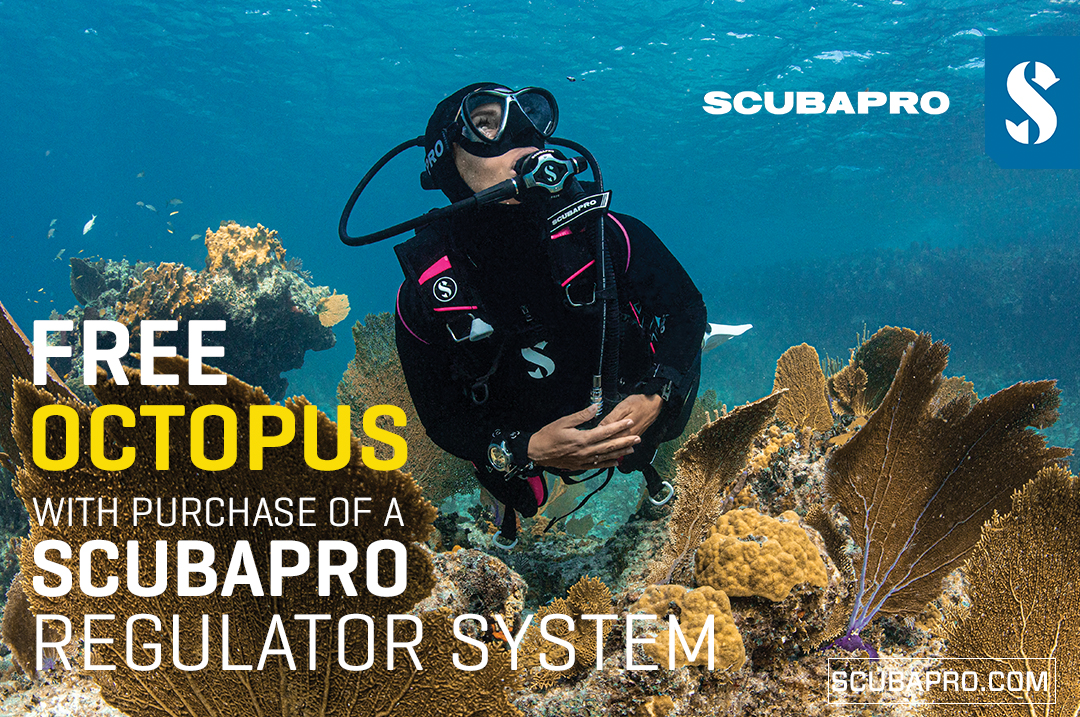
Free Octopus with every purchase of a SCUBAPRO regulator system
Just in time for the spring season, divers can save money with the FREE OCTOPUS SPRING PROMOTION! Until July 31st SCUBAPRO offers an Octopus for free
with every purchase of a regulator system!
Get a free S270 OCTOPUS with purchase of these combinations:
MK25 EVO or MK19 EVO with A700
MK25 EVO or MK19 EVO with S620Ti
MK25 EVO or MK19 EVO with D420
MK25 EVO Din mit S620Ti-X
Get a free R105 OCTOPUS with purchase of the following combinations:
MK25 EVO or MK19 EVO with G260
MK25 EVO or MK17 EVO with S600
SCUBAPRO offers a 30-year first owner warranty on all regulators, with a revision period of two years or 100 dives. All SCUBAPRO regulators are of course certified according to the new European test standard EN250-2014.
Available at participating SCUBAPRO dealers. Promotion may not be available in all regions. Find an authorized SCUBAPRO Dealer at scubapro.com.
More information available on www.scubapro.com.
-

 News3 months ago
News3 months agoHone your underwater photography skills with Alphamarine Photography at Red Sea Diving Safari in March
-

 News3 months ago
News3 months agoCapturing Critters in Lembeh Underwater Photography Workshop 2024: Event Roundup
-

 Marine Life & Conservation Blogs3 months ago
Marine Life & Conservation Blogs3 months agoCreature Feature: Swell Sharks
-

 Blogs2 months ago
Blogs2 months agoMurex Resorts: Passport to Paradise!
-

 Blogs2 months ago
Blogs2 months agoDiver Discovering Whale Skeletons Beneath Ice Judged World’s Best Underwater Photograph
-

 Gear Reviews2 weeks ago
Gear Reviews2 weeks agoGEAR REVIEW – Revolutionising Diving Comfort: The Sharkskin T2 Chillproof Suit
-

 Gear Reviews3 months ago
Gear Reviews3 months agoGear Review: Oceanic+ Dive Housing for iPhone
-

 Marine Life & Conservation2 months ago
Marine Life & Conservation2 months agoSave the Manatee Club launches brand new webcams at Silver Springs State Park, Florida



